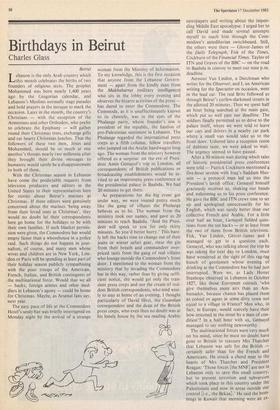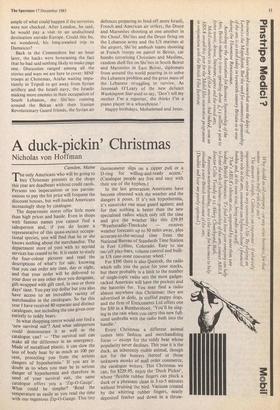Birthdays in Beirut
Charles Glass
Beirut
Lebanon is the only Arab country which this month celebrates the births of two founders of religious sects. The prophet Mohammed was born nearly 1,400 years ago by the Gregorian calendar, and Lebanon's Muslims normally stage parades and hold prayers in the mosque to mark the occasion. Later in the month, the country's Christians — with the exception of the Armenians and other Orthodox, who prefer to celebrate the Epiphany — will gather round their Christmas trees, exchange gifts and eat hearty Christmas lunches. That the followers of these two men, Jesus and Mohammed, should be so much at one another's throats nearly two millennia after they brought their divine messages to humanity would surely be a disappointment to both of them.
With the Christmas season in Lebanon have come the predictable requests from television producers and editors in the United States to their representatives here for stories about Beirut's marines at Christmas. If these editors were genuinely concerned about the marines 'being away from their loved ones at Christmas', they would no doubt let their correspondents here go home for the holidays to be with their own families. If such blanket permis- sion were given, the Commodore bar would empty faster than a whorehouse in a police raid. Such things do not happen in jour- nalism, of course, and many men whose wives and children are in New York, Lon- don or Paris will be spending at least part of their holiday season publicly sympathising with the poor troops of the American, French, Italian, and British contingents of the multinational force. Would that we all — hacks, foreign armies and other med- dlers in Lebanon's agony — could be home for Christmas. Maybe, as Arsenal fans say, next year.
The easy pace of life at the Commodore Hotel's seedy bar was briefly interrupted on Monday night by the arrival of a strange woman from the Ministry of Information. To my knowledge, this is the first occasion that anyone from the Lebanese Govern- ment — apart from the kindly man from the Mukhabarrat (military intelligence) who sits in the lobby every evening and observes the bizarre activities of the press has dared to enter the Commodore. The Commode, as it is unaffectionately known to its clientele, was in the eyes of the Phalange party, whose founder's son is president of the republic, the bastion of pro-Palestinian sentiment in Lebanon. The Phalange regarded the international press corps as a fifth column, fellow travellers who jumped on the Arafat bandwagon long ago. The woman from the ministry however offered us a surprise: on the eve of Presi- dent Amin Gemayel's trip to London, all correspondents of British publications or broadcasting establishments would be in- vited to an impromptu press conference at the presidential palace in Baabda. We had 20 minutes to get there.
As preparations for the big event got under way, we were treated pretty much like the gang of villains the Phalange believes us to he. The woman from the ministry took our names, and gave us 20 minutes to reach Baabda. 'And the Presi- dent will speak to you for only thirty minutes. So you'd better hurry.' This bare- ly left the hacks time to change out of their jeans or winter safari gear, rinse the gin from their breath and commandeer over- priced taxis from the gang of real villains who lounge outside the Commodore's front door. I mentioned to the woman from the ministry that by invading the Commodore bar in this way, rather than by giving suffi- cient notice, she would get only the tran- sient press corps and not the cream of resi- dent British correspondents, who tend wise- ly to stay at home of an evening. I thought particularly of David Hirst, the Guardian correspondent and the dean of the British press corps, who even then no doubt was at his lonely house by the sea reading Arabic newspapers and writing about the impen- ding Middle East apocalypse. I urged her to call David and made several attempts myself to reach him through the Com- modore's antediluvian switchboard. Still, the others were there — Glover-James of the Daily Telegraph, Fisk of the Times, Cockburn of the Financial Times. Taylor of ITN and Graves of the BBC — on the road to Baabda in convoy to meet our nine p.m. deadline.
Aernout Van Linden, a Dutchman who writes for the Observer, and I, an American writing for the Spectator on occasion, went in the lead car. The real Brits followed us through Beirut's curfew-darkened streets in the allotted 20 minutes. Then we spent half an hour being searched at the main gate, which put us well past our deadline. The soldiers finally permitted us to drive to the palace itself, where we were told to leave our cars and drivers in a nearby car park where a small van would take us to the front door. Ushered into a reception room of dubious taste, we were asked to wait. The urgency seemed to have passed.
After a 30-minute wait during which tales of historic presidential press conferences were told — Patrick Cockburn mentioned a five-hour session with Iraq's Saddam Hus- sein — a protocol man led us into the President's lavish office. Gemayel himself graciously received us, shaking our hands and welcoming us to his press conference. He gave the BBC and ITN crews time to set up and apologised unnecessarily for his English, which was surely better than our collective French and Arabic. For a little over half an hour, Gemayel fielded ques- tions from the ten hacks — or at least from the two of them from British television. Fisk, Van Linden, Glover-James and I managed to get in a question each. Gemayel, who was talking about the trip he was taking the next day to London, must have wondered at the sight of this rag-tag bunch of gentlemen whose evening of drinking at the Commodore bar he had just interrupted. Were we, as Lady Hester Stanhope observed in Lebanon in October 1827, like those European consuls 'who give themselves more airs than an Am- bassador, because chance has placed them as consul or agent in some dirty town not equal to a village in France? Men who, in fact, in Europe, would scarcely have their bow returned in the street by a man of con- dition'? In a half hour with us, Gemayel managed to say nothing newsworthy.
The multinational forces were very much on his mind, since he must no doubt have gone to Britain to reassure Mrs Thatcher that Lebanon was safe for the British certainly safer than for the French and Americans. He struck a chord near to the hearts of Mrs Thatcher and President Reagan: 'Those forces [the MNF] are not in Lebanon only to save this small country, but to prevent terrorism and subversion which took place in this country under the Palestinians and now in areas outside our control [i.e., the Bekaa].' He said the bom- bings in Kuwait that morning were an ex-
ample of what could happen if the terrorists were not checked. After London, he said, he would pay a visit to an undisclosed destination outside Europe. Could this be, we wondered, his long-awaited trip to Damascus?
Back in the Commodore bar an hour later, the hacks were bemoaning the fact that he had said nothing likely to make page one. Discussion ranged among all the stories and wars we are here to cover: MNF troops at Christmas, Arafat waiting impa- tiently in Tripoli to get away from Syrian artillery and the Israeli navy, the Israelis making more enemies in their occupation of South Lebanon, the Shi'ites running around the Bekaa with their Iranian Revolutionary Guard friends, the Syrian air defences preparing to fend off more Israeli, French and American air strikes, the Druze and Maronites shooting at one another in the Chouf, Shi'ites and the Druze firing on the Lebanese army and the US marines at the airport, Shi'ite ambush teams shooting at French troops on patrol in Beirut, car bombs terrorising Christians and Muslims, random shell fire on Shi'ites in South Beirut and Maronites in East Beirut, diplomats from around the world pouring in to solve the Lebanese problem and the great mass of the Lebanese struggling to survive. As Jeremiah O'Leary of the new defunct Washington Star used to say, 'Don't tell my mother I'm a reporter, she thinks I'm a piano player in a whorehouse.'
Happy birthdays, Mohammed and Jesus.







































































 Previous page
Previous page